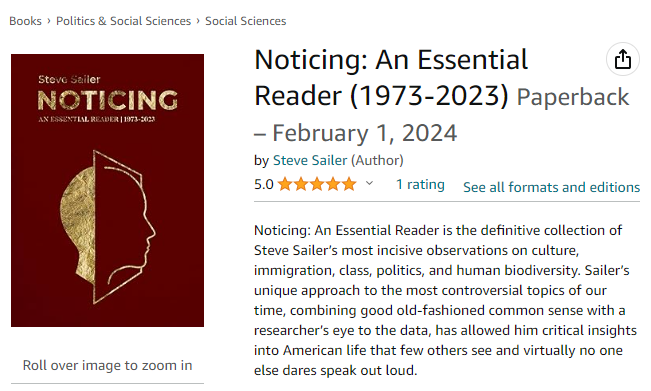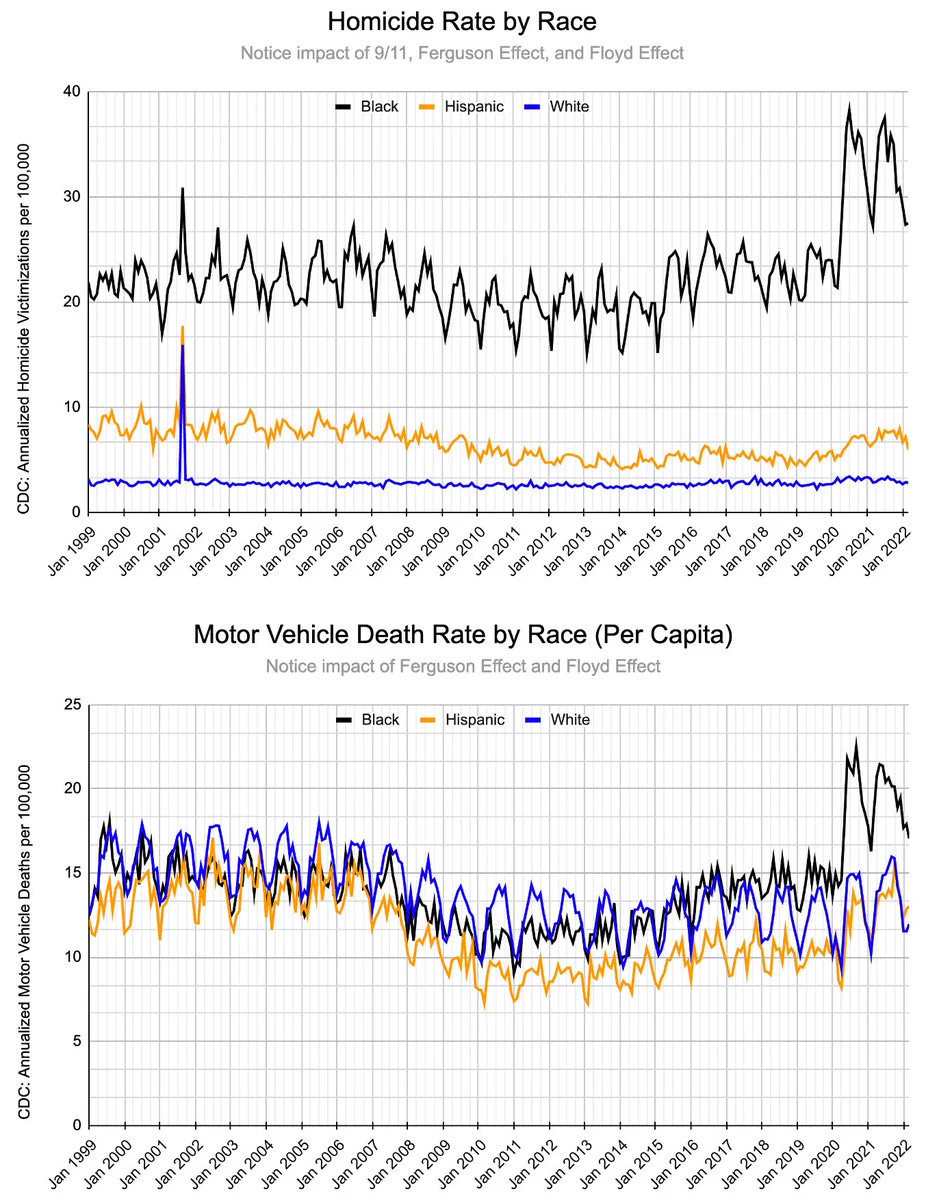Arnold Kling reviews my book "Noticing"
On his Substack “In My Tribe,” economist Arnold Kling reviews my new anthology "Noticing."
His collected essays
ARNOLD KLING
JUN 18, 2024
The book is called Noticing. It collects some of Sailer’s essays over several decades.
Sailer is known for being a “race realist.” That means that he notices differences in average IQ in statistics collected by race. In “It’s all relative,” published in 2002, he defines race this way:
A racial group is an extended family that is inbred to some degree.
All right. That is the definition of something, and you could probably make it scientific.
My problem is that I do not know how to connect the dots between that definition and the statistics about race in America. Those are based on the government’s definition, which is pretty much “We have these crude classifications that have no scientific basis. But using your folk understanding of race, pick one of these classifications to describe yourself.”
To me, if you’re going to be a “race realist,” you probably have to go with what the government says, even though as Sailer puts it (and I agree)
we Americans should be wary of using the vast power of government to exacerbate the natural divisiveness of race by officially classifying people by race.
I shared Arnold’s assumption back around 2000, when I set out to write a series of articles proving that the federal government's racial/ethnic categories were scientifically ridiculous and led to useless data. But as I studied the question in depth, I came to the opposite conclusion that ... eh ... in the big picture of things, they are good enough for government work.
After all, the logical implication of the popular argument that self-identification is a very sloppy way to collect racial statistics is that if we had a more scientific way, such as analyzing ancestry by DNA, then the racial effects we see even in the hazy federal data would be even more clear-cut in the scientific data.
And indeed, two decades later, we now have several massive databases, such as the 10,000 strong Adolescent Brain Cognitive Development sample, for which we know the genetic ancestry of each participant, plus how a parent self-identified them. My chapter in "Noticing" from 2021 entitled "A Matter of Tone" recounts that a new study of the ABCD database shows that racial admixture does indeed correlate with IQ (not super strongly, please note, but enough to matter): a finding that scientists had been arguing about, pro and con, for a century without previously having data precise enough to accurately measure racial admixture.
For example, anthropologist Margaret Mead published a reasonable critique in 1926 of early attempts to measure whether IQ correlated with degree of black ancestry just from researchers guesstimating how black a subject really was by looking at him. Mead scoffed and looked forward to scientists someday being able to do this study the right way by having an accurate measure of racial genealogy, which finally became feasible 95 years later.
Glenn Loury has objected to “race realism.”
Can we sensibly aspire to a more complete social integration than has yet been achieved of those who now languish at the bottom of American society? A political movement that answers no to this question must fail, and richly deserves to.
Well, how has America’s dominant ideology of Race Anti-Realism been working out during the Black Lives Matter era?
Not so hot … Blaming whiteness for each and every black problem has mostly succeeded in getting a lot of extra black lives murdered and killed in car crashes:
In fact, I would be willing to argue that Sailer and other race realists have better ideas than progressives for making our social arrangements less unfavorable to people with low IQ. And Loury would be the first to agree that the progressives’ go-to remedy of affirmative action is counterproductive. But in the mainstream media, the terms of the debate have been set by the self-described anti-racists, and there is no way for anyone with a different perspective to participate.
One of my favorite essays in Noticing is “Cousin Marriage Conundrum.” It appeared in January of 2003, as America was getting ready to attempt nation-building in Iraq.
In Iraq, as in much of the region, nearly half of all married couples are first or second cousins. A 1986 study of 4.500 married hospital patients and staff in Baghdad found that 46% were wed to a first or second cousin, while a smaller 1989 survey found 53% were “cosanguineously” married…
By fostering intense family loyalties and strong nepotistic urges, inbreeding makes the development of civil society more difficult. …
…In the U.S., where individualism is so strong, many assume that “family values” and civic virtues such as sacrificing for the good of society always go together. But, in Islamic countries, family loyalty is often at war with national loyalty. Civic virtues, military effectiveness, and economic performance all suffer.
…Unlike the Middle East…Europeans became increasingly sympathetic toward the right of a young woman to marry the man she loves. Setting the stage for this was the Catholic Church’s long war against cousin marriage, even out to fourth cousins or higher.
Seventeen years after this essay, Joseph Henrich published The WEIRDest People in the World, a book that argued that the distinctive culture of the West can be traced to the marriage patterns dictated by the Church, including monogamy and the ban on cousin marriage. As I wrote in my review.
The opposite of WEIRD PC is kinship or clan PC. In kinship PC, what knits a society together are familial interconnections, including many marriages among close relatives.
I find it useful to think of society as consisting of games played at three levels. There is the individual, the small group, and the large society. What you do as an individual may or may not be in the interest of the small group, so the small group has to use norms and gossip to police your behavior. What a small group does may or may not be in the interest of the larger society, so the society needs formal rules and impersonal enforcement to put boundaries around nepotism and clan favoritism.
Within this model, an inbred family is a small group that is too cohesive for a larger society to be able to control. That is why cousin marriage is incompatible with Westernization.
That is an example of Sailer “noticing.” For some reason, Henrich notwithstanding, American intellectuals have been unable to absorb this insight. Darn if we still aren’t trying nation-building in the Middle East (“Let’s put a reformed Palestinian authority in charge of Gaza.”)
Anyway, there’s lots more on Noticing from Arnold on his Substack so please go read the whole thing there.
By the way, you can buy Noticing in paperback from Passage Press (free shipping in the United States with promo code WILSON) or in Kindle instant download from Amazon. (Overseas shipping of the paperback might be cheaper from Amazon — I haven’t checked lately. We make less money per copy when you buy from Amazon, but Amazon is extraordinarily adept at logistics.)




O/T
Willie Mays died today at 93. This means the oldest-living member of the baseball hall of fame is Luis Aparicio, who turned 90 in April.
The denial of biological reality is getting people killed